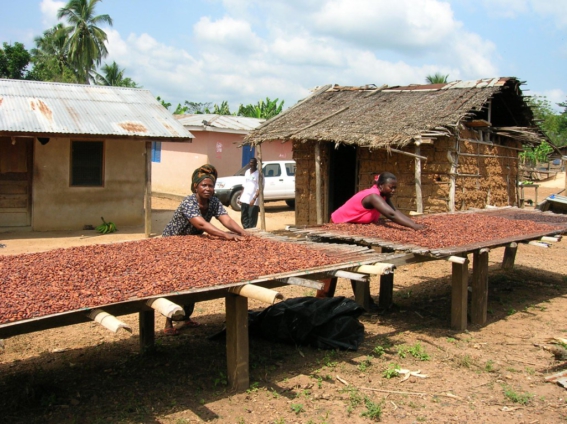
Audio By Carbonatix
Ghana, along with its neighboring cocoa powerhouses, has been grappling with an outbreak of black pod disease—a dreaded menace that causes cocoa pods to blacken and rot.
This has led to a rise in cocoa prices to a 13-year high, leaving farmers and experts grappling with the grim reality of a diminished harvest and compromised bean quality.
The disease has the potential to severely impact both the quality and quantity of cocoa beans produced. Fuad Mohammed Abubakar, the head of Ghana Cocoa Marketing Co., speaking to Bloomberg warned that the disease can prove catastrophic for the cocoa supply.
The leading cocoa-producing countries including Ivory Coast, Ghana and Nigeria, have witnessed a decline in cocoa shipments.

According to reports, Ivory Coast farmers have exported approximately 2.24 million tons of cocoa in the current season, slightly less than the 2.29 million tons recorded the previous year. The situation is causing ripples across the global cocoa market, with concerns about a potential shortage in supply and subsequent price hikes.
Reflecting the challenges faced by the cocoa industry in Ghana and West Africa, cocoa futures in London have soared by over 20% this year. Most-active futures reached £2,544 a ton, a figure not seen since mid-2010. In New York, cocoa futures also climbed 1.7% to $3,412, highlighting the global market's growing concern over the supply situation.
The situation is said to be mainly caused by heavy rainfall across West Africa, which has disrupted the harvest and exacerbated the spread of the black pod disease.
This weather phenomenon, characterized by hot and dry conditions, poses a significant risk to cocoa production.
This worrying trend is fueling fears that the anticipated smaller harvest may not be sufficient to make up for the shortfall experienced during the main crop harvest.
Ghana, alongside other West African nations, relies heavily on the two annual cocoa harvests to sustain its economy and meet global cocoa demands.
Sola Ogunsola, a Nigerian farmer, laments the impact on coastal cocoa farms, where many developing pods have been lost to the disease.
In addition to damaging the crops, the torrential rain has made roads impassable, hindering the transportation of chemicals for plantation treatment and cocoa delivery to ports.
Latest Stories
-
NSA introduces dual authentication system for 2025/26 enrolment exercise
46 minutes -
Fuel prices to increase from Feb. 16, influenced by cedi’s depreciation
58 minutes -
GNFS to launch automated fire safety compliance system to modernise regulation
1 hour -
NALAG president commends Local Gov’t Minister for payment of assembly members’ allowances
1 hour -
Is having a physical security operations center in your business worth it?
1 hour -
Asiedu Nketia recounts fierce political wars in Ajumako-Enyan-Essiam constituency
1 hour -
NRSA sets up committee to probe road crashes involving Toyota Voxy
2 hours -
Cocoa farmers decry the adverse impact of producer price cut on livelihoods
2 hours -
Families who lose relatives to ‘no bed syndrome’ must sue health facilities – Dr. Nawaane
2 hours -
Ghana Sports Fund: Dr. David Kofi Wuaku outlines vision for Youth Empowerment growth through sports
2 hours -
NUGS President urges sustainable digital governance
2 hours -
National Investment Bank kicks off Ghana Sports Fund with landmark seed donation
2 hours -
Two young siblings found dead in unsecured manhole
2 hours -
Cocoa Prices, Producer Prices, and the Smuggling Debate: What the data actually suggests
2 hours -
CRAG signs vehicle finance deal with Bank of Africa to boost fleet expansion
2 hours

